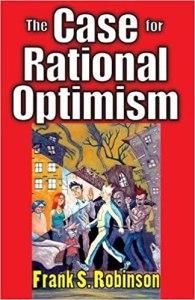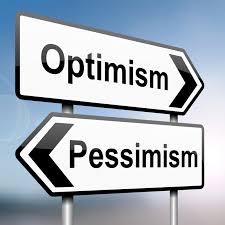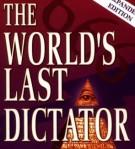
My blog, “The Rational Optimist,” was started in 2008 while writing my book The Case for Rational Optimism. That now seems long ago, in far-away galaxy.
I have argued that a species capable of living in the Sahara and the Arctic could cope with climate change. But also that while we must do everything reasonably possible to curb greenhouse gas emissions, even reducing them to zero (impossible) would not stop temperatures rising. So we must also work on defensive preparations, and ways to cool the planet. Yet climate warriors seem to wage an anti-industrial jihad, fixated solely on emission reduction. Even there, nuclear power should play a big role; but many oppose that too. And the recent global climate conference, COP26, was pretty much a cop-out.
So our climate action is too little, too late, and global warming looms faster and more severe and harmful than once thought. Humanity may still be resourceful enough to cope, though at great cost. Yet there’s danger of a tipping point to runaway warming that feeds on itself. Earth’s climate has always naturally cycled through warmer and colder periods, but that could be thrown off-kilter by human activity, a significant new factor.

Venus shows what a runaway greenhouse effect can do. Reaching a permanently toasty temperature — high enough to melt metal. Something no life can survive.
Recently I listened to a 2017 public debate, by serious scholars, on “Is democracy committing suicide?” Suicide may not be quite the right word, but the proposition was that democracy does have characteristics dooming it. Those so arguing had much scary fodder to invoke. The other side said things like Brexit and Trump’s election actually show democracy working. Considering it, at least in advanced countries like America, deeply resilient, its institutions strong enough to withstand challenges.

Note was made of Trump’s ominous 2016 refusal to say he’d accept the election outcome. What if, one debater queried, in 2020 he loses but calls on his supporters to reject that result? Well, it happened. Our democracy survived — but just by the skin of its teeth.
Numerous examples tell us a democracy is just one dumb vote away from autocracy. In America it might take two. A recent poll showed Trump defeating Biden.
Our species’ entire progress, from its beginnings, has been achieved through reason. We are very smart, but not smart enough to avoid many pitfalls of irrationality. Rejecting reality is the essence of irrationality. And that’s Trumpism, rejecting the reality of the 2020 election; of his rotten character; of his party whitewashing January 6. The reality of making America not great again, but shredding what makes it great. Yet some voters are turning against Democrats because of . . . mask mandates. Returning Trump to power would slap rationality in the face.
Democracy was so ascendant in the late 20th Century because it fulfills a basic human thirst for recognition of one’s individual dignity and value, as Francis Fukuyama argued in The End of History. And its debate defenders were right that people won’t knowingly give it up — though actually polls show increasing numbers saying democracy is not that important, and they’d be fine with military rule.

Too many fall for the idea of a strongman, to fix everything. (Strongmen never do, one debater observed; instead they find scapegoats.)
And they never come in saying, “No more democracy.” Indeed, democracy has become so entrenched as a fundamental human value that even the worst regimes pretend to honor it. The world’s autocrats, after being caught flat-footed for a time by democracy’s rise, eventually perfected techniques for manipulating it — giving it the death of a thousand cuts — and then to prevent its resurrection. Thus Venezuela’s regime is impregnable despite crashing GDP by 75%; Russians cannot get rid of Putin even as he drives them to catastrophe.

The paragon is China — it too insists it’s “democratic” — taking the surveillance state to heights beyond Orwellian, making life impossible for anyone not the regime’s obedient toady. The picture of the world’s 1984 future?
Even before 2016, I kept saying America’s democracy is not ordained by God, and could not be forever sustained without a citizenry deeply internalizing its values, understanding what it’s all about. Which was already crumbling. Democracy is not just a matter of elections; more importantly it’s a culture. Of which a key aspect is pluralism — accepting people unlike you having a legitimate role, even having power. That ethos is stomped down in today’s America.

The debate questioned whether democracy is its own worst enemy, allowing people to make bad choices. But an enemy at least as dangerous is guns. However strong people’s democratic feelings may be, guns can be stronger, especially when wielded by regimes without scruples. Look at Myanmar’s army, at war with the entire populace. Too many countries have militaries that are good for nothing — nothing — except using force upon their own populations, to entrench their power and privileges. Guns and democracy don’t mix. That’s why America’s ever growing gun infatuation bodes ill.
An important basis for my 2008 optimism was the post-WWII rules-based world order, evolving into the post-cold war Pax Americana. While guns did continue wreaking havoc within countries, at least major advanced nations were no longer using them against each other. That has now changed. Russia’s monstrous crime against Ukraine is another assault on human rationality. And a huge test, whose outcome will be enormously consequential. If Russia, however bloodied, is seen to ultimately prevail, subjugating Ukraine, we’ll be living in a different and uglier world. While if Russia is bloodied and thwarted, the lesson will be salutary. So much hangs on Ukrainians’ strength and courage.

For the moment at least, those inspiring Ukrainians, and a stronger global response than expected, are antidotes to pessimism. On the other hand, it’s always depressing how many dupes will dance to a tune like Putin’s.
And it’s another weakness of democracy that a lot of people “don’t care about politics.” Thus being oblivious when the thousand cuts begin. Disengagement from politics — not having to worry about it — is actually a luxury of living in a stable democracy, under rule of law, cosseting people (as it should). Inhabitants of Myanmar don’t have that luxury.
Yet broadly speaking, it’s true that politics is not everything. Science, technology, and commerce should continue improving quality of life. And America and its people (even most Trumpers) have many great virtues of which democracy is only one. Without it maybe the rest can endure. Even under a Trump dictatorship, most of ordinary daily life might go merrily along. At least half a loaf. I’ve promised my wife we won’t move to Canada unless truly necessary.

The “yes” side won that debate. I once dreamed of living to see a news headline about the ouster of “The World’s Last Dictator.” Now I wonder if it will be the end of “The World’s Last Democracy.”
